How to hold jews harp correctly
Here are the main conditions for successful sound production with a jews harp having a soft frame and narrow gaps between the tongue and frame.
Some beginners might be deterred by metallic clank which appears when playing at some jews harps; also, excess strain of many small muscles of hand and lips might be of concern. Often in such cases one may think than he is “hitting his teeth”, or “this jaw harp is faulty”, but this is not so. The jews harp tongue touches the frame because the player himself presses the frame too hard. The instruments having tiny gaps between the frame and tongue (gaps are one of the factors determining the instrument quality, the smaller the gaps, the louder the sound, and the wider the spectrum is), and soft frame, are prone to clanking. Some beginners in such cases go straight to jews harps with wider gaps and a harder frame, and sooner or later get into a habit of holding a jews harp squeezing it very hard, which makes future diversity and quality of sound production impossible or very difficult.
Though, following several simple rules will help completely get rid of this effect and enjoy playing a jews harp in a more relaxed manner, without excess effort and producing clear and gentle sounds
Main causes of clanking
- 1. Hold. The hand should not apply any force pressing the frame prongs together. One should hold them like two flat planks, not squeezing the instrument in the fist like tube or ring. Hold is the basis of clear sound.
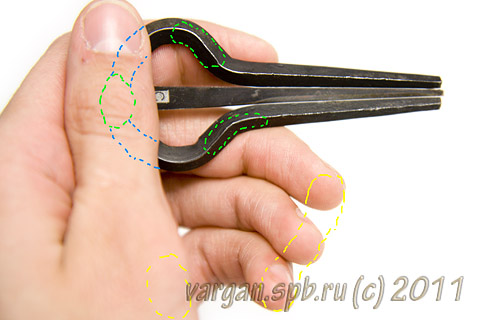
How to hold jews harp correctly – the first joint of thumb presses the frame base strictly in the direction perpendicular to the frame plane; index and middle fingers – strictly in opposite direction (areas marked green). Some parts of thumb base and/or little finger tip touch the cheek or chin enabling full control of hand shift against the head (areas marked yellow).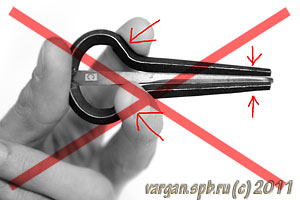
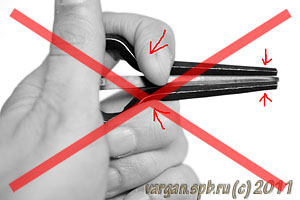
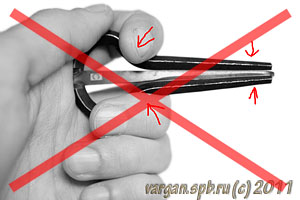
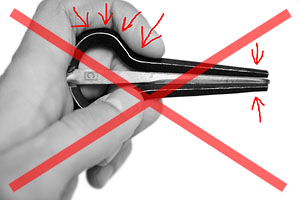
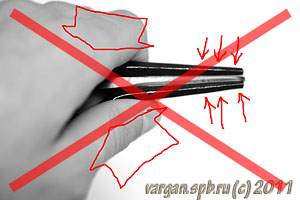
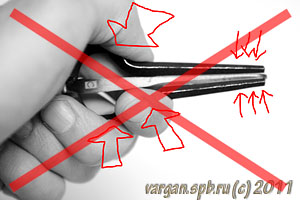
Fig. 2-7: Wrong ways of jews harp holding – the fingers squeeze the frame from the top and bottom. 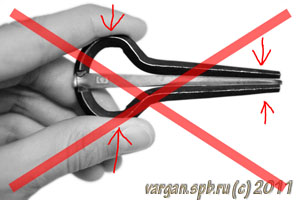
Fig. 8: Wrong way of jews harp holding – the fingers not only squeeze the frame from the top and bottom, but also do not fix the instrument within the frame plane – the jews harp may rotate around the vertical axis, and cannot be pressed well against the teeth.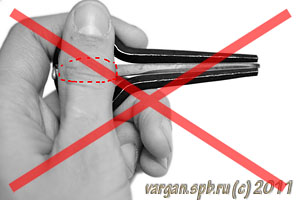
Fig. 9: Wrong way of jews harp holding – the thumb touches the tongue and damps the sound. - The force of frame pressing against the teeth. Jew’s harp should not be pressed too hard or too weak; it is quite easy to find the right force by experiment; the frame should be always held tight on the teeth and not break away when the tongue vibrates.
- Frame squeezing with lips. Often this is just not noticed until one looks in the mirror. When producing the first sounds all attention is focused on the hand holding the instrument, while the lips are living on their own. You can open the lips deliberately and stop touching the frame prongs to make sure they do not interfere with playing, and then start closing up the lips slowly on the frame to make the produced sound louder. No extra force!
- Moving the lower jaw. This is one of the most hardly perceptible and at first incomprehensible causes also leading to clanking. It starts when one is playing actively and excitedly (like when speaking in a raised voice). Keep a poker face!)
- Accuracy of stroke. This is another factor that can make the tongue deviate while oscillating and touch the frame – an oblique stroke. The pathway of the stroke at the moment when the finger touches the tongue tip should be strictly perpendicular to the frame plane. One should not pull the tongue elbow either along (like “picking it out” from the attachment point) or pluck it edgewise (upwards or downwards).
We hope, these recommendations will fully help you master high sensitive jews harps and focus on playing music, not “forcing sounds out”!
